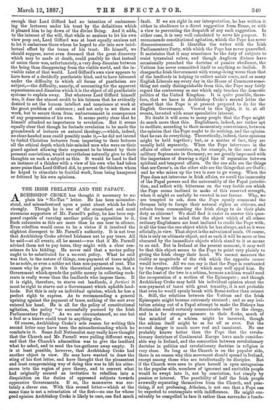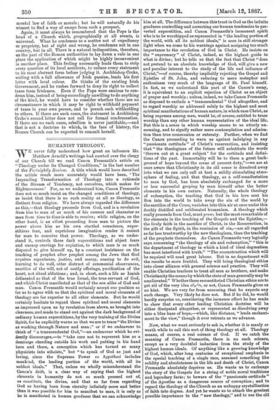THE IRISH PRELATES AND THE PAPACY.
ARCHBISHOP CROKE has thought it necessary to ex- plain his " No-Tax " letter. He has been misunder- stood, and misunderstood upon a point about which he feels strongly. Though he is one of the staunchest and most strenuous supporters of Mr. Parnell's policy, he has been sup- posed capable of running another policy in opposition to it. Such calumnies as this are more than he can bear in silence. Even rebellion would cease to be a virtue if it involved the slightest disrespect to Mr. Parnell's authority. It is not true that Archbishop Croke advised Irishmen not to pay taxes. All he said—at all events, all he meant—was that if Mr. Parnell advised them not to pay taxes, they might with a clear con- science do his bidding. He never said that a no-tax policy ought to be substituted for a no-rent policy. What he said was that, in the nature of things, non-payment of taxes might be as noble, or even a nobler act than non-payment of rent. The reason why he gives it this theoretical preference is, that a Government which spends the public money in collecting rack- rents is really worse than the landlords who impose them. If it is right, therefore, to starve out landlords, a fortiori it must be right to starve out a Government which upholds land- lords. Bat this is only an individual opinion, which he has a perfect right to express. As to recommending a general uprising against the payment of taxes, nothing of the sort ever entered his head. He is all for the policy of constitutional agitation, the policy "so successfully pursued by the Irish Parliamentary Party." As we are circumstanced, no one but a fool or a knave could trust to anything else.
Of course, Archbishop Croke's sole reason for writing this second letter may have been the misunderstanding which he combats in it. Some dull Nationalist may really have thought that the Church and Mr. Parnell were pulling different ways, and that the Church's admonition was to give the landlord what he asked, and to send the tax-gatherer away empty. It is at least possible, however, that Archbishop Croke had another object in view. He may have wanted to draw the sting of his first letter, and have thought that the pleasantest and least compromising way of doing this was to lift his utter- ances into the region of pure theory, and to convert what had originally seemed an invitation to rebellion into a disquisition on the duties of oppressed subjects towstrds oppressive Governments. If so, the mancenvre was cer- tainly a clever one. With this second letter—which at the same time is not a retractation of the first—no one for whose good opinion Archbishop Croke is likely to care, can find much fault. If we are right in our interpretation, he has written it either in obedience to a direct suggestion from Rome, or with a view to preventing the despatch of any such suggestion. In either case, it is very well calculated to serve his purpose. It recommends constitutional agitation, which the Pope has never discountenanced. It identifies the writer with the Irish Parliamentary Party, with which the Pope has never quarrelled. It maintains that it may sometimes be the duty of subjects to resist tyrannical rulers, and though Anglican divines have occasionally preached the doctrine of passive obedience, the Vatican has never committed itself to anything so foolish. It charges the Irish Government with wrong-doing worse than that of the landlords in helping to collect unfair rents, and as many English Liberals say every day in the House of Commons some- thing not easily distinguishable from this, the Pope may fairly regard the controversy as one which only touches the domestic politics of the United Kingdom. It is quite possible, there- fore, that we have in Archbishop Croke's second letter the utmost that the Pope is at present prepared to do for the English Government. Viewed in this light, it is, at all events, invested with some speculative interest.
No doubt it will seem to many people that the Pope might do much more than this. Englishmen, indeed, are rather apt to oscillate, according to their momentary convenience, between the opinion that the Pope ought to do nothing, and the opinion that he can do everything. Theoretically, indeed, these opinions might be held together ; but, as a matter of fact, they are usually held separately. When the Pope intervenes in the affairs of other countries, as, for example, in the case of the military Septennate in Germany, we are greatly impressed with the importance of drawing a rigid line of separation between spiritual and temporal affairs. On the one side are the things that are Caner's, on the other side are the things that are God's ; and he who mixes up the two is sure to go wrong. When the Pope does not intervene in Irish affairs, we recall the immensity of the Papal powers and the universality of the Papal jurisdic- tion, and reflect with bitterness on the very feeble use which the Pope seems inclined to make of this reserved strength, when it might so usefully be exerted in our favour. Why, we are tempted to ask, does the Pope openly command the German laity to forego their natural rights as citizens, and refrain from commanding the Irish clergy to do their plain duty as citizens I We shall find it easier to answer this ques- tion if we bear in mind that the object which of all others ordinary Englishmen are least inclined to credit the Pope with, is all the time the one object which he has always, and as it were officially, in view. That object is the salvation of souls. Of course, this is only an ultimate object, and as such it will be more or less obscured by the immediate objects which stand to it as means to an end. But in Ireland at the present moment, it may well be that this object seems to the Pope to point very plainly to giving the Irish clergy their head. We cannot measure the reality or magnitude of the risk which the opposite course would involve. All we can say is that the Pope is confronted by two dangers either one of which may well appal him. By far the least of the two is a schism, because a schism would need the co-operation of a section of the Episcopate ; and though Archbishop Croke may hold his individual opinion about the non-payment of taxes with great tenacity, it is not probable that even he would openly break with Rome rather than retract it. Still, the relations between the Vatican and the Irish Episcopate might become extremely strained ; and as any irri- tation arising out of a Papal attempt to make the Bishops less Nationalist would certainly communicate itself to the clergy, and in a far stronger measure to their flocks, much of the mischief of a schism might be incurred, though the schism itself might be as far off as ever. But the second danger is much more real and imminent. No one probably knows better than the Pope that the revolu- tionary doctrines of Continental Europe have made consider.'
able way in Ireland, and the connection between revolutionary doctrine in polities and revolutionary doctrine in religion is very close. So long as the Church is on the popular side, there is no reason why this movement should spread in Ireland, except among those who are intellectually its disciples. But
if the Church were seen to place herself in open antagonism to the popular side, numbers of ignorant and excitable people would be swept into it, not by conviction, but simply by passion or interest. The possibility of half the Irish people avowedly separating themselves from the Church, and prac- tising, if not professing, Atheism, is not one that a Pope can be expected to contemplate with indifference. He might con- ceivably be compelled to face it rather than surrender a funda-
mental law of faith or morals ; but he will naturally do his utmost to find a way of escape from such a prospect. Again, it must always be remembered that the Pope is the head of a Church which, geographically at all events, is universal. What he condemns as a matter not of expediency or propriety, but of right and wrong, he condemns not in one country, but in all. There is a natural indisposition, therefore, en the part of the Roman authorities to lay down a rule in one place the application of which might be highly inconvenient in another place. This feeling necessarily leads them to strip every question of its local accidents, to reduce every statement to its most abstract form before judging it. Archbishop Croke, writing with a full allowance of Irish passion, loads his first letter with local colour. He thinks of the existing Irish Government, and he rushes forward to deny its right to collect taxes from Irishmen. Even if the Pope were anxious to con- demn him, instead of being exceedingly unwilling to do anything of the kind, he would have to consider whether there are no circumstances in which it may be right to withhold payment of taxes in your own person, and to preach such withholding to others. If there are such cases, the statement in Archbishop Croke's second letter does not call for formal condemnation. If there are no such cases, rebellion is never justifiable,—and that is not a doctrine to which, in the face of history, the Roman Church can be expected to commit herself.



































 Previous page
Previous page